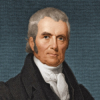John Marshall

John Marshall
John Marshallwas the fourth Chief Justice of the Supreme Court of the United States. His court opinions helped lay the basis for United States constitutional law and many say made the Supreme Court of the United States a coequal branch of government along with the legislative and executive branches. Previously, Marshall had been a leader of the Federalist Party in Virginia and served in the United States House of Representatives from 1799 to 1800. He was Secretary of State under...
NationalityAmerican
ProfessionJudge
Date of Birth24 September 1755
CountryUnited States of America
I told him, 'I'm not going to allow you to be the cause of (stroke) number three.
The water would lay on the inside of the track. The drainage system will take care of that.
The very essence of civil liberty certainly consists in the right of every individual to claim the protection of the laws, whenever he receives an injury. One of the first duties of government is to afford that protection.
They have made a habit of knowingly making false statements ? lying ? and today they pass it off as spin like this is some sort of game. It's not. This isn't called spin, it's called lying to the public. And it's illegal.
They want to be good. They want to work at it. If you just mention, 'You guys need to watch extra film this week because this team is unique in their offense,' shoot, you'll see those two coming in all on their own. They've been very good for us.
It's a little bit of a bellwether for the Western Slope.
No principle of general law is more universally acknowledged, than the perfect equality of nations. Russia and Geneva have equal rights. It results from this equality, that no one can rightfully impose a rule on another....As no nation can prescribe a rule for others, none can make a law of nations.
Certainly all those who have framed written constitutions contemplate them as forming the fundamental and paramount law of the nation, and consequently the theory of every such government must be, that an act of the legislature, repugnant to the constitution, is void.
The institution of Masonry ought to be abandoned as one capable of much evil, and incapable of producing any good which might not be affected by safe and open means.
Let the end be legitimate, let it be within the scope of the constitution, and all means which are appropriate, which are plainly adapted to that end, which are not prohibited, but consist with the letter and spirit of the constitution, are constitutional.
The most lively fancy aided by the strongest description cannot equal the reality of the opera.
Seldom has a battle, in which greater numbers were not engaged, been so important in its consequences as that of Cowpens.
That the people have an original right to establish, for their future government, such principles as, in their opinion, shall most conduce to their own happiness, is the basis, on which the whole American fabric has been erected.... The principles, therefore, so established, are deemed fundamental. And as the authority, from which they proceed, is supreme ... they are designed to be permanent.... The powers of the legislature are defined, and limited; and that those limits may not be mistaken, or forgotten, the constitution is written.
No one imagines that a law professing to tax will be permitted to destroy.